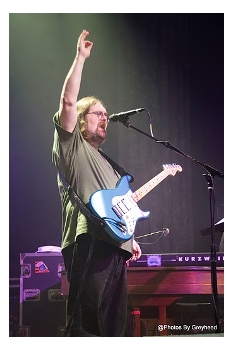
Jeff Mattson has been a local hero to New York-area Deadheads for over 30 years thanks to his work with the Zen Tricksters and that band’s predecessor, the Volunteers. In the past decade the guitarist has caught the attention of music fans across the country, first through his appearances in an early incarnation of Phil Lesh & Friends and more recently as the lead guitarist’s in Donna Jean Godchaux’s current band. In the past year he’s solidified his role as one of the 21st century’s preeminent Grateful Dead guitarists by taking over for John Kadlecik as lead guitarist in Dark Star Orchestra, a group that features former Trickster Rob Barraco. Below Mattson discusses his new role in Dark Star, upcoming shows with Barraco and the future of his longtime band the Zen Tricksters.
You were recently named John Kadlecik’s replacement as lead guitarist in Dark Star Orchestra. When did the band first approach you about joining?
It’s a while back now. I guess when they first found out that J.K. was going out to do some shows with Furthur, they gave me a call to see if I would be able to fill. That was last November, but it was strictly filling in because this is before they knew that John would be leaving Dark Star. It was a pretty natural fit—I know all those guys and, of course, I played with Barraco for 12 years or something in the Zen Tricksters. And I am somewhat familiar with the material [laughs]. But from there it became obvious to them that they were going to have to replace John so we just started talking about the possibility of my joining the band. They weren’t sure for a while what they were going to do and they wanted to check out some other folks, as they should…
It’s funny that you say were “somewhat” familiar with the Grateful Dead because, though the Zen Tricksters was known for its Dead covers, you have never played in a band that solely covers the Grateful Dead before.
I kind of never really did that before. You know, the Zen Tricksters always had their songs. The Dead was what got people in the door, and we love playing the stuff, but we always, even from back when the band was originally the Volunteers, did original music too. We also wouldn’t shy away from if we felt like playing a song by another artist as well, so we never made that commitment to just doing the Grateful Dead. I’m sure there’s a lot of people out there who wished we would of but we always just kept that open.
There was a period back in the ‘80s where we were really, really on top of the repertoire. I had gone through a period when we were up to date with the stuff on In the Dark and Built to Last, so we knew all that stuff and all the covers they were doing at the time. But a lot of that stuff fell out of the repertoire as the band changed members and some of these songs I hadn’t played for 20 years. But, needless to say, Dark Star Orchestra is a professional band and you never want to go onstage without nailing the thing so we really rehearsed everything.
On the flip side, were there any periods of the Grateful Dead’s history that you encouraged Dark Star to tackle? I noticed they covered a show from the 1960s for the first time.
Well, I think that there was some resistance because some of the stuff from that period actually had two keyboard players, T.C. and Pigpen. Pigpen also played harmonica so I think there was some debate in the band whether you could do those shows without really having the two keyboard players or having someone to play the harmonica. The first shows from that period that the band played were the ’72 shows. Dino English, one of the drummers, was having a baby so he was going to miss about six shows. Since the band had to play single drummer shows they said, “What the hell, let’s go for it.” We did a run of six Europe ’72 shows when Pigpen was in the band, and we just didn’t do the harmonica. Of course there was only one keyboard player in the band but Rob Barraco just does a great job doing the Pigpen stuff—the Pigpen raps on “Good Lovin’” and “Turn on Your Love Light”—while he’s playing the keys. He has an organ onstage so he can also reach over and do any of Pigpen’s organ parts if anything really important comes up on the organ.
We just had a great time doing that and then one night on the last tour we had to change venues because of a flood. The show got moved indoors, and we didn’t have as much room on stage. We decided to just got for it and do a ’69 show and had a tremendous time doing that. That’s always been one of my favorite periods. Rob Barraco has really embraced the Pigpen thing—he’s really just doing a great job with that. It was really the crown of the real psychedelic era—the jams were the longest, and they have that raw, psychedelic energy in ’69. Anyone who grew up listening to Live/Dead, there you have it.


No Comments comments associated with this post